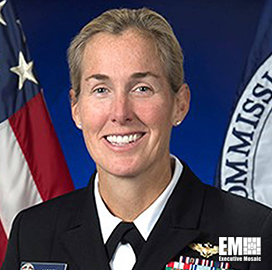Rear Adm. Nancy Hann has received Senate confirmation to lead the National Oceanic and Atmospheric Administration’s (NOAA) Office of Marine and Aviation Operations (OMAO) and the agency’s Commissioned Officer Corps.
She will oversee NOAA’s fleet of nine aircraft, 15 survey ships, uncrewed systems, 1,000 civilian personnel and 330 uniformed officers under NOAA Corps and OMAO, the agency said Wednesday.
“From flying into hurricanes to crewing remote explorations to the deepest depths of the ocean, the NOAA Corps drives NOAA’s science forward,” said Gina Raimondo, the secretary of commerce.
Hann most recently served as NOAA Corps’s deputy director and OMAO’s deputy director for operations. Her career at NOAA also includes work as a pilot, flight meteorologist, liaison to U.S. Pacific Command and executive officer for the agency’s Marine Operations Center-Atlantic.





